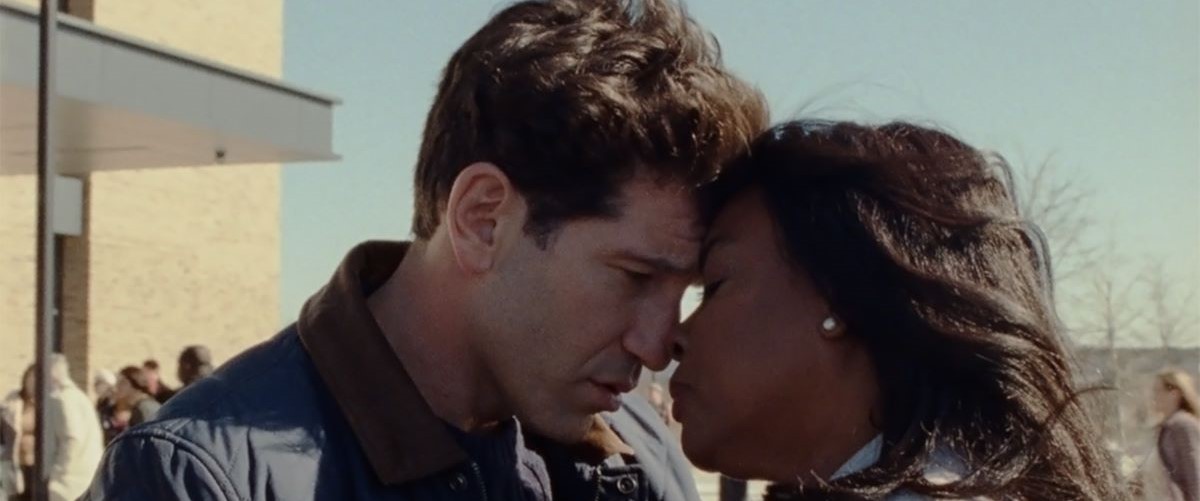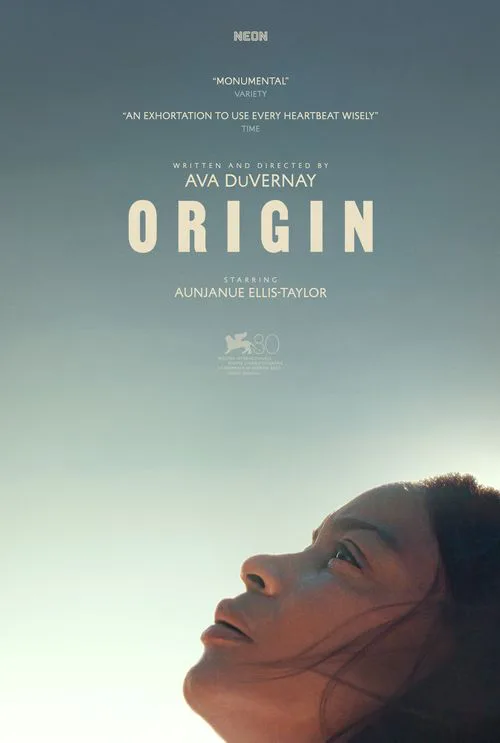Ava DuVernay is an inquisitive filmmaker, curious about social structures and collective grief. Her newest picture, the ambitious investigative film, “Origin,” has a scene that blends DuVernay’s interests with her rigor. Following a sold-out public talk for her book The Warmth of Other Suns, Isabel Wilkerson (Aunjanue Ellis) bumps into her persistent editor Amari (Blair Underwood) backstage. He wants her to write about the recent death of Trayvon Martin, a tragedy that is impacting the nation at the time. “You have a stable of writers,” Isabel playfully balks. “They don’t have Pulitzer Prizes,” he coolly resorts. Though it’s all done in jest, Isable does have a pragmatic reason for not jumping in. “I want to be in the story, really inside the story,” she says. “And yes, that takes time.” A methodological ethos for DuVernay’s career, the scene also explains the emotional labor required to watch “Origin.”
However, DuVernay’s adaptation of journalist Isabel Wilkerson’s nonfiction work Caste: The Origins of Our Discontents, isn’t a duty or a burden. It brims with intoxicated conviction. Isabel and her adoring husband Brett (Jon Bernthal) are an ideal couple, comfortable in the other’s habits and sympathetic to one another’s needs. They begin the film searching for an assisted living home for Isabel’s mother (Emily Yancy). Isabel knows maternal loss is coming. Isabel suffers grave setbacks, tragedies that ultimately inspire her to throw herself into writing a book about Martin. The sprawling work won’t just concern race—racism as a concept limits our understanding of what happened to Martin.
“Origin” aims to link the violent repercussions of American slavery to the horrific crimes of the Holocaust to India’s degrading caste system in a narrative that combines gnawing grief with a cyclical sense of history. Though many question the logic behind Isabel’s thesis, she travels to Germany to visit monuments (The Empty Library) and the Berlin State Library in a bid to discover whether the “Final Solution” borrowed from American slavery. During a dinner, intermingled with gentle music and relaxing red wine, her Jewish-German friend Sabine (Connie Nielsen) makes her doubts known. “A framework is not a book, my friends,” says a patronizing Sabine. “She’s trying to connect the United States with Germany. But it doesn’t fit.” The camera cuts to a low angle; Isabel tries to remain calm. Her wild, frantic eyes, however, betray her disdain as Sabine explains American slavery to this Black woman. The anger simmering within Isabel isn’t academic. It’s a tenacity to break assumptions that Ellis-Taylor fully embodies.
Visually translating Isabel’s book is a tricky task. Shooting on film helps. The consistency offered by 16mm means that DuVernay doesn’t rely on tawdry means, such as adding an ugly patina to the photography to indicate changes in decades. Because whether she jumps from Nazi Germany or to Jim Crow South or to early 20th century India, DuVernay wants her aesthetic continuity to mirror Isabel’s connective thesis. The texture of film also establishes the necessary intimacy required for witnessing. Cinematographer Matthew J. Lloyd loves close-ups, trusting Ellis-Taylor to conjure Isabel’s twisting stream of emotions.
For her part, DuVernay carves quiet opportunities for dynamic reflection to take place. These hushed moments can be personal, such as when Isabel recalls the time she met her husband, Brett. Years ago, he humbly crossed his suburban street to help her with an obstinate white exterminator, challenging the worker to finish the job. Brett, tellingly, recognizes his own white knighting. “Did I just mansplain,” he asks Isabel. “Well, you did ask permission … and if you hadn’t,” says a blushing Ellis-Taylor. “I’d be in white savior mode,” Brett responds. The flirtatious text is one Bernthal, an actor of exceptional soulfulness, has studied. It’s an answer Isabel handsomely accepts.
Isabel’s cousin Marion (a tender Niecy Nash) offers Isabel acceptance and laughs, prompting her to distill her thesis into simple terms, even while struggling with her own health. Nash’s humor and patience balances with the film’s heady topics. A recharged Isabel continues her research, venturing to India to meet with Dalit professor Suraj Yengde (as himself) to learn about the Dalit activist Bhimrao Ambedkar (Gaurav J. Pathania). Though Isabel is there to research the Dalit caste, her application of “caste” isn’t culturally specific. Rather its broader definition, the privileges systemically inherited by a “dominant” class of people, is her lens for analyzing the shared mechanics of dehumanization and oppression that have occurred across cultures, countries, and generations.
While it can be exhilarating to see Isabel make these connections, some scenes lack such elasticity. When her basement is leaking, for instance, Isabel calls a plumber (Nick Offerman) who arrives wearing a red MAGA cap. Through her grief, she convinces the plumber to actually fix the leak. But the sequence feels too didactic and on-the-nose to be revelatory. That doesn’t mean “Origin” should be dismissed as a lengthy lecture. At its core, “Origin” is a journalistic film. Similar to all great reporting, it demands for the viewer to not look away. Thus, as Isabel continues to research—interviewing, reading, and writing—what we see is a Black woman at work in a profession that cinematically is too often reserved for white people. In turn, “Origin” becomes a cumulative statement for DuVernay’s cinematic demand for the viewer to bear witness.
The director’s achievement is rare in Hollywood. Black women are often excluded from the industry before they can build a robust body of work. But from DuVernay’s “I Will Follow” to “When They See Us,” you can see her increased command in intermingling collective ache with imperative action. Here, she is meditative, poetic, and nearly unfaltering. Importantly, the director’s desire never erodes into degradation porn. In fact, the film’s ending—a swirling, lyrical, tightly constructed summation of Isabel’s argument—is a landmark in DuVernay’s visual lexicon. Sometimes too overt, “Origin” isn’t a perfect movie. But the character of a truly great film isn’t found in its perfection. Rather it arises from how the narrative moves, challenges, and hugs the heart. Rich in thought, “Origin” is a dense, forceful masterwork, and, quite simply, the most radical film of DuVernay’s career.




















